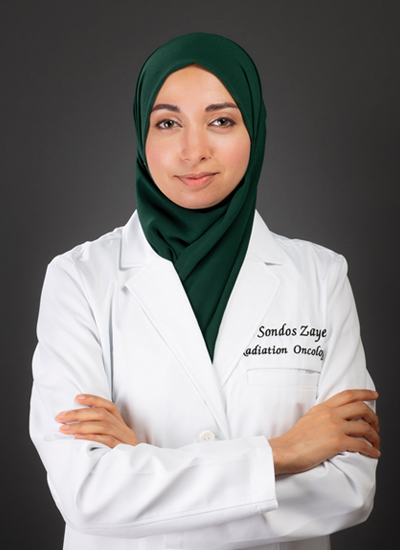Learner Perspectives: Dr. Sondos Zayed on research and representation in radiation oncology
 Dr. Sondos Zayed is a third-year resident in Radiation Oncology. Inspired by patients to address quality of life concerns, she is currently co-leading a clinical trial on pain management for patients with head and neck cancers receiving radiation treatment.
Dr. Sondos Zayed is a third-year resident in Radiation Oncology. Inspired by patients to address quality of life concerns, she is currently co-leading a clinical trial on pain management for patients with head and neck cancers receiving radiation treatment.
She is also looking at female authorship in the field of radiation oncology and has created an online community for Muslim women in medicine through her blog, Medicine Unveiled, to share experiences and advice.
Why did you decide to pursue radiation oncology?
Radiation oncology is a one-of-a-kind, niche specialty in medicine. We treat cancers with high energy x-rays and electrons. I was drawn to it for many reasons: it’s the perfect mix of medicine, physics, and sophisticated technology and imaging. I have the privilege of being able to play a meaningful role in every patient’s cancer journey. It’s extremely rewarding and I’m grateful to be able to do what I do every day.
What is your clinical research focused on?
My academic interests primarily focus on clinical research in head and neck, lung and gynecological cancers. I’ve also had the opportunity to open a clinical trial at the London Regional Cancer Program as a Co-Principal Investigator under the supervision of Dr. David Palma. When head and neck cancer patients receive radiation treatment, they experience this extremely painful sunburn-like reaction in their mouth and throat called mucositis. This randomized clinical trial compares different analgesic regimens to manage mucositis so that patients are able to complete their curative treatments. We’re very excited about the impact this trial might have on patients’ quality of life.
You have also explored female authorship trends in radiation oncology. What did you learn?
Radiation oncology has traditionally been a male-dominated specialty. The reasons for this are complex. I wondered if female radiation oncologists were actually under-represented in the published literature as well. Answering this question would at least allow us to identify any issues so that their root causes can be addressed.
We found that although women in my field were not under-represented in the literature, and in fact female authorship was increasing over time, they did not occupy ‘high-profile’ authorship positions (first, second or senior authors). The challenge now is figuring out why that’s the case and ensuring that women have the same mentorship and career-advancing opportunities as their male counterparts. With more women discovering and entering the field, I am very hopeful.
What inspires you as a clinician and researcher?
My patients inspire me to continue to address important issues that they come to me with. I’ve also had the privilege of having wonderful mentors who teach and inspire me with how they identify, think about, and then go about answering clinically meaningful questions.
You have published a series of guides on your blog (Medicine Unveiled) about wearing a hijab as a practising physician. What motivated you to share your experience?
There are very few visibly Muslim women in medicine, especially in Quebec where I trained. I decided to create an online community where I could share tips and tricks that I’ve learned along the way so that other women out there in similar shoes didn’t feel like they were on this journey alone.
It was also my way of emphasizing the fact that we should never have to choose between our faith, values, and our passion for medicine. I continue to receive emails from women around the world asking about hijab OR tips or sharing their lived experiences, asking for advice or giving me their tips. It’s been wonderful.
What advice would you give your younger self?
Stay humble and true to your values. Never doubt yourself. Believe you can and you will.








